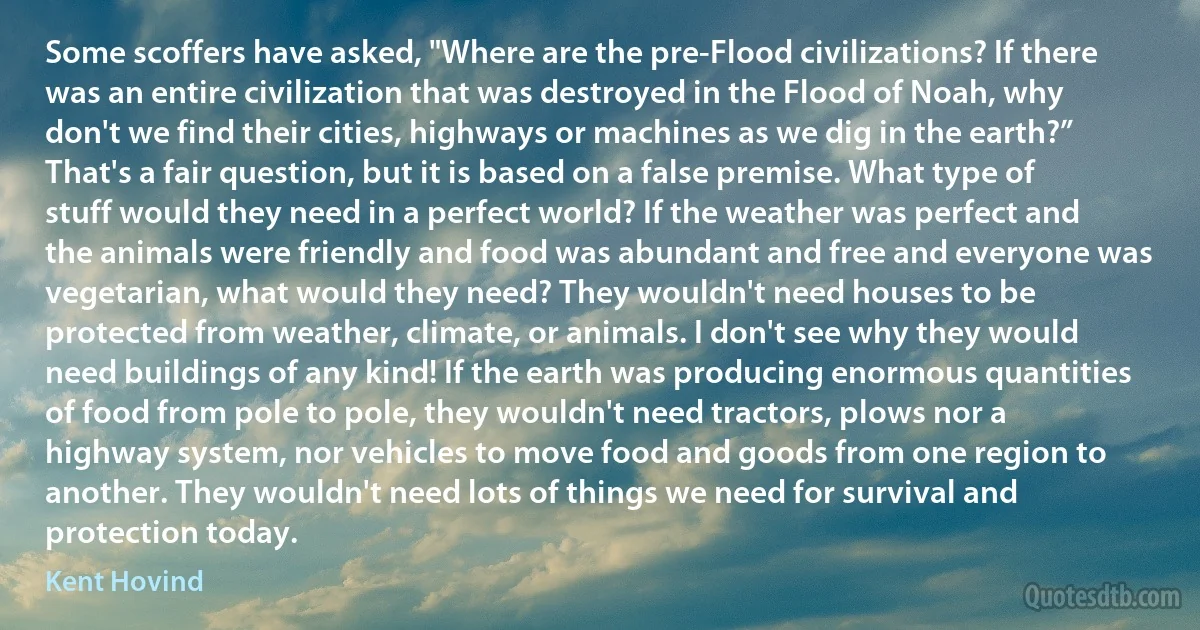
Some scoffers have asked, "Where are the pre-Flood civilizations? If there was an entire civilization that was destroyed in the Flood of Noah, why don't we find their cities, highways or machines as we dig in the earth?” That's a fair question, but it is based on a false premise. What type of stuff would they need in a perfect world? If the weather was perfect and the animals were friendly and food was abundant and free and everyone was vegetarian, what would they need? They wouldn't need houses to be protected from weather, climate, or animals. I don't see why they would need buildings of any kind! If the earth was producing enormous quantities of food from pole to pole, they wouldn't need tractors, plows nor a highway system, nor vehicles to move food and goods from one region to another. They wouldn't need lots of things we need for survival and protection today.
Kent HovindRelated topics
climate dig earth entire everyone fair false find flood food free friendly goods highway kind move need noah nor perfect premise question region see weather world today lots thingsRelated quotes
If Christ were to walk in this world today, do you know what would happen to Him? He would be placed in a mental institution and given psycho-therapy, just as would His Saints. The world would crucify Him today just as it did 2000 years ago, for the world has not learned a thing, except more devious forms of hypocrisy. And what would happen if, in one of my classes at the university, I would one day tell my students that all the learning of this world is of no importance beside the duty of worshipping God, accepting the God-man who died for our sins, and preparing for the life of the world to come? They would probably laugh at me, and the university officials, if they found out, would fire me-for it is against the law to preach the Truth in our universities. We say that we live in a Christian society, but we do not: we live in a society.

Seraphim Rose
Among the fundamental values linked to women's actual lives is what has been called a 'capacity for the other.' Although a certain type of feminist rhetoric makes demands 'for ourselves,' women preserve the deep intuition of the goodness in their lives of those actions which elicit life, and contribute to the growth and protection of the other.... But, in the final analysis, every human being, man or woman, is destined to be 'for the other.'... Therefore, the promotion of women within society must be understood and desired as a humanization accomplished through those values, rediscovered thanks to women. Every outlook which presents itself as a conflict between the sexes is only an illusion and a danger; it would end in segregation and competition between men and women, and would promote a solipsism nourished by a false conception of freedom.

Pope Benedict XVI
There's a human race, and different skin colors, and different racial, what we call racial characteristics. There's several theories about where those come in. Probably the best theory is that the Tower of Babel, which would have been a few hundred years after the flood, is where the races began. When god confused the languages, they went off into their small groups, all speakin' the same language. And if you get a small in-breeding group, you know, 2000 years after the creation, you're gonna get genetic disorders, and racial traits could be a result of this Tower of Babel incident. But I think that there's no question from scripture and from science that all humans are the same race, and have the same genetic code, and certainly can interbreed. So there's no reason scripturally to be a racist. You know, we all came from Adam and Eve, and then later from Noah and his family.

Kent Hovind
Aside from the equation it draws between making money and being good, the modern ideal of a successful life posits a further linkage between making money and being happy. This latter association rests on ... assumptions. First, it is presumed that identifying what will make us happy is not an inordinately difficult task. Just as our bodies typically know what they need in order to be healthy... so, too, the theory goes, can our minds to be relied upon to understand what we should aim for so as to flourish as whole human beings. ... Second, it is taken for granted that the enormous range of ... consumer goods available to modern civilization is not merely a gaudy, enervating show responsible for stoking desires bearing little relevance to our welfare, but is, rather, a helpful array of potentialities and products, capable of satisfying some of our most important needs.

Alain de Botton
Little effort was made to explain Saddam's culpability, his misuse of Iraqi resources, or the fact that we were not embargoing medicine or food. I was exasperated that our TV was showing what amounted to Iraqi propaganda...I must have been crazy; I should have answered the question by reframing it and pointing out the inherent flaws in the premise behind it. Saddam Hussein could have prevented any child from suffering simply by meeting his obligations. Instead, I said the following: 'I think this is a very hard choice, but the price, we think, the price is worth it.' As soon as I had spoken, I wished for the power to freeze time and take back those words. My reply had been a terrible mistake, hasty, clumsy, and wrong. Nothing matters more than the lives of innocent people. I had fallen into a trap and said something that I simply did not mean. That is no one's fault but my own.

Madeleine Albright
